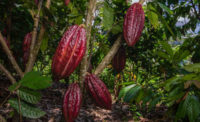More than three-quarters (77 percent) of Nestlé’s agricultural commodities are verified as deforestation-free, the company announced Tuesday.
Nestlé made a no-deforestation commitment in 2010 to ensure that none of its products globally would be associated with deforestation by 2020. Over the years, the company has worked with partners like Airbus and Earthworm Foundation and its suppliers to identify areas at risk of deforestation. The company is using a combination of tools, including certification, supply chain mapping, on-the-ground verification and satellite imagery from the Starling system to achieve this goal.
Starling is the result of a fruitful collaboration between Airbus, Earthworm Foundation and Nestlé. Nestlé is now using the system to monitor its entire palm oil supply chain. Pilots in pulp and paper are also underway, and the company plans to extend it to soy later in 2019. Starling’s cutting-edge technology helps Nestlé understand better where deforestation occurs, what drives it and who is involved. The company uses this information to verify compliance, challenge its suppliers and prioritize transformative actions.
"Innovation and technology like Starling is accelerating our journey towards zero deforestation,” says Magdi Batato, executive v.p., head of operations, Nestlé S.A. “This is transforming the way we manage deforestation risks in our palm oil supply chain – we are using this tool to hold our suppliers and ourselves accountable. We are satisfied with our progress, but there is much more to do. The last miles to go are always the hardest."
Transparency is essential in ensuring sustainable supply chains. Nestlé has also published a Transparency Dashboard that uses Starling data to provide information on deforestation trends observed near the mills it sources from.
"Starling turns terabytes of satellite images into actionable insight, enabling customers to understand where and why deforestation happens and make the best possible decisions," said Grazia Vittadini, chief technology officer, Airbus.
Nestlé will continue to engage with all suppliers to fulfill its no-deforestation commitment more quickly. In particular, the company also recognizes the need for a collaborative approach to improve smallholders capacity in eliminating deforestation. Nestlé is working to find solutions that ensure sustainable supply chains while respecting people’s rights to improve their livelihoods.
Combating deforestation requires true transformation of all global commodity-based supply chains – and this is a shared responsibility. Nestlé therefore invites other consumer goods companies to adopt innovative satellite monitoring services to accelerate efforts to achieve deforestation-free supply chains and transparently report on their progress.



